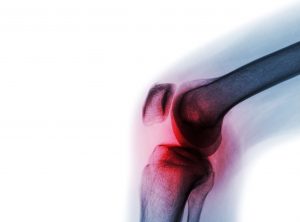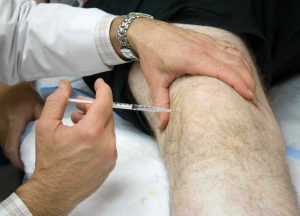Injections for Arthritis of the Knee
What is Osteoarthritis of the Knee?
 Osteoarthritis is the wear and tear on a joint that comes with aging. As we age the joints can begin to break down from tiny amounts of damage to the cartilage that cushions the bones from rubbing on each other. The damage that osteoarthritis causes leads to additional inflammation hastening the cycle of breakdown until the joint eventually will fail without medical intervention. When treating osteoarthritis, the goal is to slow the progression of the condition to maximize the lifespan of the joint while controlling the amount of pain the patient feels. Patients may eventually need a patellofemoral replacement, partial knee replacement, or total knee replacement. Patients with no meniscus can possibly avoid development of osteoarthritis with a meniscus transplant. Pain management of osteoarthritis can often be achieved with over the counter NSAIDs and reducing inflammation of the joint when it flares up. In the U.S., almost 21 million adults are living with osteoarthritis. And one of the body’s critical joints — the knee — is the most frequently affected. More than 30% of people over 50 have knee osteoarthritis. So do a whopping 80% of those over 65. In fact, about 100,000 people in the U.S. can’t get from their bed to the bathroom because of osteoarthritis of the knee.
Osteoarthritis is the wear and tear on a joint that comes with aging. As we age the joints can begin to break down from tiny amounts of damage to the cartilage that cushions the bones from rubbing on each other. The damage that osteoarthritis causes leads to additional inflammation hastening the cycle of breakdown until the joint eventually will fail without medical intervention. When treating osteoarthritis, the goal is to slow the progression of the condition to maximize the lifespan of the joint while controlling the amount of pain the patient feels. Patients may eventually need a patellofemoral replacement, partial knee replacement, or total knee replacement. Patients with no meniscus can possibly avoid development of osteoarthritis with a meniscus transplant. Pain management of osteoarthritis can often be achieved with over the counter NSAIDs and reducing inflammation of the joint when it flares up. In the U.S., almost 21 million adults are living with osteoarthritis. And one of the body’s critical joints — the knee — is the most frequently affected. More than 30% of people over 50 have knee osteoarthritis. So do a whopping 80% of those over 65. In fact, about 100,000 people in the U.S. can’t get from their bed to the bathroom because of osteoarthritis of the knee.
Injections for arthritis of the knee
There are two common injections for osteoarthritis of the knee. Corticosteroid injections and hyaluronic acid injections.
Corticosteroid injections for arthritis of the knee
Neurosurgeons and Pain Management Specialists use Steroid injections to inject a high dose of medication directly into a particularly problematic spot in the body. Specialists often used this type of treatment for joint issues and rheumatoid arthritis. These medications may also sometimes help alleviate conditions affecting the soft tissues, like tendon inflammation. Steroids and corticosteroids help to reduce inflammation. The human body can produce corticosteroid hormones on its own, but physicians can use a synthetic version of those hormones to relieve a wide range of conditions. Although very fast-acting and effective, Steroid Injections do wear off over time.
Doctors can inject corticosteroids into joints, muscles, and other tissues around the spine and the bloodstream. Steroids like hydrocortisone help to relieve bursitis and muscle and tendon pain. Other steroids like triamcinolone and methylprednisolone treat painful joints.
Corticosteroid injections are commonly used for acute flair ups of the arthritic inflammation. Patients will often come to see an orthopedic surgeon for the first time for knee pain that is really becoming detrimental to their active lifestyle and find they have arthritis in their knee. It is common practice to treat a patient in this level of pain with a in office corticosteroid injection mixed with a little anesthetic. This initial injection will help ease the immediate pain for a short period of time while the steroid works to reduce the inflammation of the joint. Many patients have their pain go into a dormancy period after an injection of this nature, but for those that do not additional, more costly, treatments are available.
Hyaluronic Acid knee injections
Hyaluronic acid injections are a common secondary step in treating arthritis of the knee but due to their cost may not be used until insurance company is satisfied that other conservative methods have failed to achieve success. Hyaluronic acid injections come under the name of many brands, with variable number of shots in the series, and may be natural or synthetic. The original injections were natural products derived from the comb of a rooster, but these days synthetic products are favored due to the possibility of allergic reaction to chicken proteins. When the shots are administered the hyaluronic acid acts to hydrate the joint, reducing the amount of friction, with the goal of slowing the degradation of the joint and easing the day to day pain felt by the patient. Not all patients respond well to hyaluronic acid joint injections and studies on effectiveness have mixed results. If you are suffering from arthritis of the knee you should discuss all your treatment options with an orthopedic surgeon of your choice.


